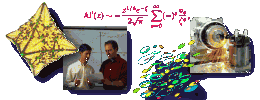|
 |
 |
|
 |
||
| Up |  |
|
 |
Numerical Methods for Large-Scale Ill-Posed Inverse ProblemsJulianne ChungUniversity of Maryland, Computer Science Department Tuesday, September 15, 2009 15:30-16:30, Many scientific and engineering applications require numerical methods to compute efficient and reliable solutions to inverse problems. The basic goal of an inverse problem is to compute an approximation of the original model, given observed data and knowledge about the forward model. Physical systems that require reconstruction of an unknown input signal from the measured output signal are natural examples of inverse problems. In other systems, the internal structure of an object is desired, but only measured output data is provided. The difficulty with ill-posed inverse problems is that small errors may give rise to significant errors in the computed approximations, so regularization must be used to compute stable solution approximations. Furthermore, real-life applications often require the computer to process extremely large amounts of data, and previously proposed methods for solving inverse problems are not adequate for these large-scale problems. In this talk, we investigate hybrid methods for regularization of linear and nonlinear least squares problems and describe an efficient parallel implementation based on the Message Passing Interface (MPI) library for use on state-of-the-art computer architectures. Regularization for nonlinear Poisson based models, such as those arising from digital tomosynthesis reconstruction, is significantly more challenging. However, reconstruction algorithms for polyenergetic tomosynthesis will be discussed, and numerical experiments illustrate the effectiveness and efficiency of the proposed methods. Speaker Bio: After graduating from Emory University in 2004 with a BA in mathematics and dance and movement studies, Julianne Chung received her Ph.D. in Computational Mathematics at Emory University in 2009. Her advisor was James Nagy. As a graduate student, she received a Department of Energy Computational Science Graduate Fellowship. She conducted a summer research practicum at the Lawrence Berkeley National Laboratory, working with Chao Yang. Julianne was recently awarded a National Science Foundation Mathematical Sciences Postdoctoral Research Fellowship, and currently she is in the Department of Computer Science at the University of Maryland, working with Dianne O'Leary. Her research interests include numerical methods for ill-posed inverse problems, image processing for biomedical applications, and high-performance computing for large-scale problems.
Contact: B. W. Rust Note: Visitors from outside NIST must contact Robin Bickel; (301) 975-3668; at least 24 hours in advance. |